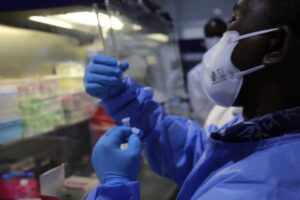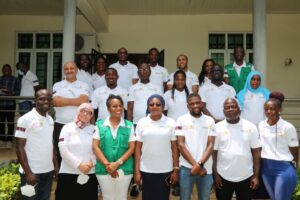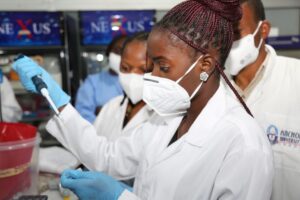Building SARS-CoV-2 sequencing and bioinformatics capacity on the African continent

The COVID-9 pandemic severely affected the world economy and public health. In response, various strategies have been employed to tackle the disease, including the development of effective vaccines. Genomics was a crucial component in the early public health response, aiding scientists and researchers to understand the origin, genomic diversity, transmission, and evolution of SARS-CoV-2, the causative agent of COVID-19. Genomics has since become the standard for surveillance tracking of the evolution of new variants of interest (VOI) and variants of concern (VOC) in real time.
While significant work has been done to build genomics capacity in Africa, there are still opportunities to further advance the knowledge, skills and competence of the workforce to deliver quality genomic sequences and reports for public health decisions. In this regard, the African Society for Laboratory Medicine (ASLM) through a CARES grant and in collaboration with the Africa Centres for Disease Control and Prevention (CDC) Africa Pathogen Genomics Initiative (Africa PGI), supported a two-week training workshop on SARS-CoV-2 sequencing and bioinformatics analysis from 17-29 July 2022 at the African Centre of Excellence for Genomics of Infectious Diseases (ACEGID) in Nigeria.

The 14 laboratory professionals, including 6 women and 8 men, who participated in the training represent nine African countries, including Chad (1), Equatorial Guinea (1), Ethiopia (1), Guinea (2), Liberia (2), Libya (1), Morocco (2), Nigeria (2), and Zambia (2). These professionals work at National Public Health Institutes (NPHI’s) or NPHI-affiliated institutes.
The training activities began after a brief welcome and introductory session by Prof Folarin Onikepe, Deputy Director of ACEGID at Redeemer’s University in Ede City, Osun State, Nigeria and a tour of the ACEGID genomics laboratory. Participants then moved on to their main objective: receiving hands-on training on SARS-CoV-2 genome sequencing and bioinformatics analysis. The training course covered the principles of genome sequencing, total nucleic acid extraction, library preparation, sequencing using the Illumina and Oxford Nanopore platforms, bioinformatics analysis and application. A post-training test was conducted at the end of the course and certificates of completion awarded.

‘This training has been beneficial, because I am now competent in SARS-CoV-2 sequencing using Illumina and oxford Nanopore platforms and bioinformatics analysis using tools such as the Galaxy project,’ said participant . ‘These are skills necessary for our SARS-CoV-2 genomic surveillance activities in Zambia.’
She and other participants will be now be able to independently conduct sequencing, handle genomics data, share genomes, analyse SARS-CoV-2 genomes using publicly available bioinformatics tools, interpret SARS-CoV-2 genomics analysis data and use sequencing data to inform the SARS-CoV-2 outbreak response. ASLM congratulates the participants and looks forward to their contributions towards increasing genomic sequencing capacity on the continent.
To learn more about ASLM projects and activities supporting laboratory capacity and workforce development in Africa, please visit ASLM’s website.
Author: Dr Aquillah Kanzi
Editors: Mrs Bethanie Rammer
Photos: Fikayo Oyawale (ACEGID)
About ASLM
Established in 2011, the African Society for Laboratory Medicine (ASLM) is a pan-African professional body focused on improving healthcare by strengthening all aspects of laboratories including workforce strengthening, quality improvement and accreditation, regulation(s) harmonization, networks strengthening, and advocacy and communication strengthening. Laboratory testing is pivotal for disease diagnosis, epidemiological surveillance, outbreak investigation, and treatment initiation and monitoring, as well as research and development. ASLM addresses these challenges by working collaboratively with governments; national, regional and international organizations; implementing partners; the private sector; and other agencies to achieve its strategic vision goals. ASLM is endorsed by the African Union with support from the World Health Organization, Africa CDC, the US CDC, the US President’s Emergency Plan for AIDS Relief, the World Bank, the Clinton Foundation, UNAIDS, and others.
